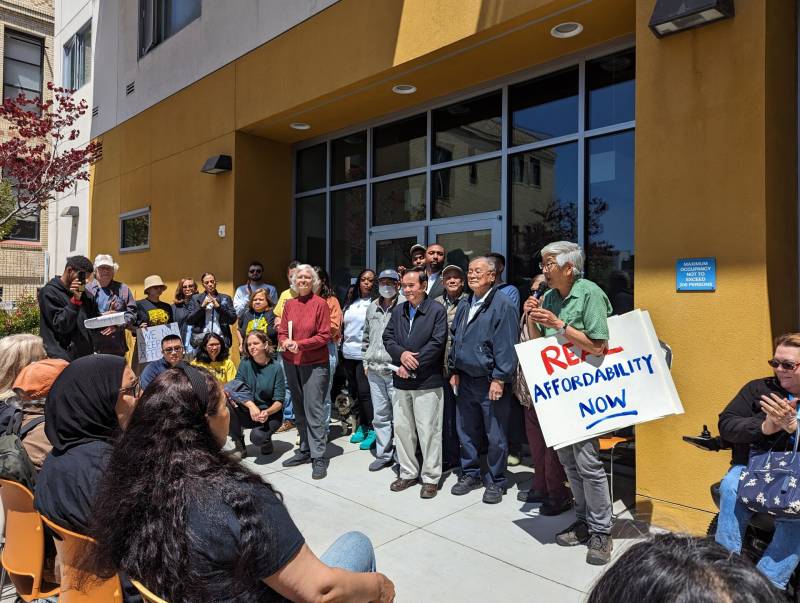Chinese seniors who are members of the Community Tenants Association, an organization that supported Peskin’s mayoral campaign kickoff in April, attended the rally in support. They carried signs reading “Real Affordability Now” in English and with Chinese-language messages such as “Waited for 17 years, still no affordable housing.”
The organization’s president, Wing Hoo Leung, said this measure was long overdue.
“We have many members who have been waiting for senior housing for over 10 years on the waiting list,” Leung said in Cantonese, with the aid of an English-speaking interpreter. “Then some of them finally receive offer of housing, but are then told they do not qualify because their income is way too low. This is not justice.”
The proposal comes as Peskin, who has long counted on the support of Chinatown groups that aid low-income seniors and families, aims to strengthen his bona fides with his core supporters ahead of November’s mayoral election.
Gen Fujioka, a policy director with the Chinatown Community Development Center, said Peskin’s proposal was based on community frustration. Many tenants would come to the Chinatown Community Development Center’s housing clinic on Clay Street and ask the staff for help when they could no longer afford their rent as they grew older.
The housing clinic staffers often have no city resources to offer extremely low-income seniors, Fujioka told KQED.
“We have no place to tell them except when you actually get put on the street, where you go to find shelter. That’s it,” Fujioka said. “That wears down our souls.”
Theresa Flandrich, a North Beach resident who famously fought back an Ellis Act eviction in 2015, said the senior housing funding would have given her neighbors another option during their eviction battle.
“My upstairs neighbor actually died during our eviction because there was no place to go,” Flandrich said. “She had crossed the entire city trying to find housing that was affordable, and there were waitlists that were closed for five years, for eight years. And that hasn’t changed much in the last decade because there’s not enough truly affordable housing.”
The measure does not involve tax increases or bonds; instead, it would draw from the city’s general fund to create the Housing Opportunity Fund, which would exclusively help extremely low-income households.
Funding increases may be a tough sell with the Board of Supervisors as the city faces a budget deficit of $1.3 billion over the next five years. In a December memo, Mayor London Breed asked departments to freeze the creation of new positions and to make reductions. Peskin said he’s open to tweaking the charter amendment should his colleagues have budgetary concerns.
“It’s going to be tough to do,” Peskin said. “But there’s never a good time, and now is the time.”
A state-mandated goal for San Francisco to build 82,000 housing units by 2031 may favor the proposal. Of that housing, 14,000 units are supposed to be for extremely low-income households.
If passed by the Board of Supervisors, Peskin’s proposed charter amendment would appear before voters this November and require a simple majority for approval.

